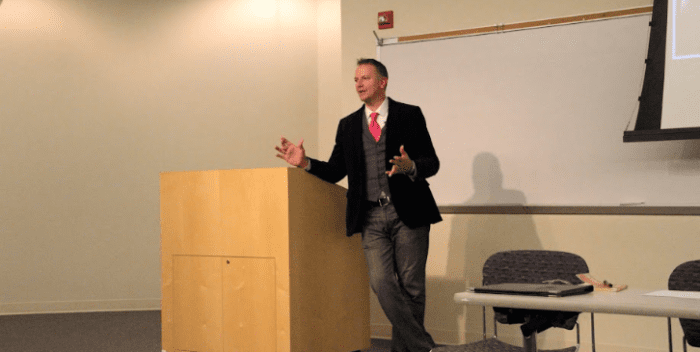Psychologist: everyone can be a leader
Photo description: Dr. Shann Ray Ferch addresses student attendees in the Thom Auditorium
Photo credit: Bailey Mooney
Josiah Horvath
Sower Staff
Everyone can be a leader, and good leadership is about listening, forgiveness and love, a psychologist told students, faculty and the community this week.
The lecture by Dr. Shann Ray Ferch was held on the Concordia campus and was centered on the studies of leadership and forgiveness and the importance of these, with the motif of love spread throughout.
“Leadership is this huge field now,” said Ferch, “and it was almost nothing in America as for studying it until about 40 years ago.”
Ferch, who teaches leadership and forgiveness studies at Gonzaga University, poetry at Stanford University and poetry for the Center for Contemplative Leadership at Princeton Theological Seminary, attributes the rise of leadership studies to the corruption of businesspeople as perceived by the public from events during the dot-com era from about 1995 to 2000.
Ferch, who is a poet, novelist and lead consultant for Leadership Spirit International, said these perceptions led people to believe that students going into business should learn leadership, although he acknowledged that teaching leadership is not necessarily going to lead to good leadership.
Ferch discussed the qualities and characteristics of the “bad leader” and the “good leader.” In reference to a bad leader, the audience responded with terms such as ignorance and cruelty. Also mentioned was the Dark Triad, a psychological theory consisting of narcissism, Machiavellianism and psychopathy.
Forgiveness, listening, empathy, accountability, responsibility, foresight and intelligence, among others, were listed by the audience as qualities associated with a good leader.
“We are in the golden age of research on love itself,” Ferch said.
A strong emphasis on love was associated with being a good leader, which he described as a servant-leader, where the interests of the leader are to serve the interests of the led. He quoted Bell Hooks, an American author, theorist, educator and social critic: “to lead is to love.”
The true test of a servant-leader, Ferch said, is that those around them become more wise, more free, more autonomous, more healthy and better able themselves to become servants; and the least privileged of society are benefited or at least not further deprived.
Robert Greenleaf, who died in 1990, was a Quaker credited for being the founder of the modern leadership movement. Greenleaf was frequently quoted and referenced by Ferch, who said he believed everyone was a leader.
“[It’s] not like you have to be the top leader,” Ferch said, “but everyone has an influence on people.”
On the topic of forgiveness, Ferch said it is not easy to do, but people have to overcome the idea that others are responsible for why their life is bad or why they are hurting.
“Forgiveness is deep, and forgiveness asking and making atonement is even deeper,” he said. “Once you start asking for forgiveness and making atonement, everyone forgives a lot easier after that, because it is so hard to overcome one’s ego.”













